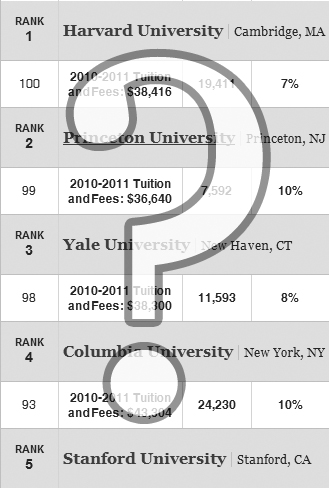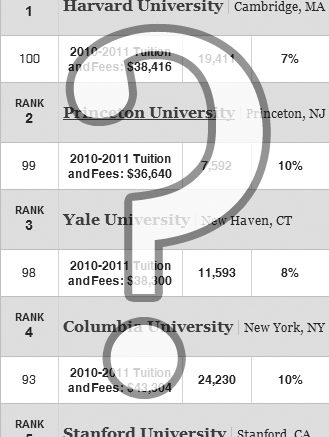
There is a common misconception, especially in our high expectation-crazed MSJ population, that stellar college rankings represent best personal fit. A generic number assigned to a university is rapidly becoming replicated on our personal college lists. Even worse, we have started to apply to these “top tier” colleges simply because they are “top tier.” How many times have you heard someone (or maybe even yourself) say that the reason they are applying to Stanford is because “it’s one of the best colleges in the US! And everyone applies, so I will too…even though I doubt I’ll get in.” The whole world is applying to highly ranked colleges, so we will too because, well, it’s the “Mission” thing to do, right?
Government Teacher Jaime Richards follows any type of ranking with one cynical question: “On what basis?” We should not blindly believe in a ranking without clearly understanding why it was given a particular rank. So on what basis do organizations such as US News or Princeton Review base their college rankings? US News claims that their college rankings are heavily based on objective data such as graduation rate, selectivity, and courses offered. Yes, these factors should be highly weighted in any prospective applicant’s mind; however, such facts and figures tend to clog our reasoning capabilities to the point where we forget to consider the college subjectively.
Each college caters to a different type of mentality. Technical schools are usually not for students who are looking for a core connection to humanities because they focus mainly on applied science and mathematics. So, if you want to be an English major, it may not be in your best interest to choose Caltech, Carnegie Mellon, or MIT. On the other hand, if you are a technology junkie, you probably should not apply to Swarthmore, Claremont, or Amherst.
Of course, I cannot fault the college ranking system for trying its best to present students with an unbiased ordering of the best schools in the US. Harvard and Princeton University may have earned their impeccable rankings, but the right approach to college rankings should be more specific to a student’s interests. Instead of choosing from a generic list of the top schools in the country, narrow down your search based on programs that you are interested in. Individually research each program through college visits, college research sites, and current student reflections. You may look at the rankings, but do not let them be your primary decision making factor. This will prove to be a far more valuable search strategy because the ranking’s basis is much more geared towards your personal goal. Once you acknowledge these rankings, do not forget to emphasize your own ranking system. Think about location, cost, majors, social life, and you may find a small liberal arts college like Pomona College ahead of UC Berkeley or Stanford University.
If we learn to create our own ranking system for colleges, we will not only be less dependent on sources catering to general masses, but we will also be more insightful about our final college list. The college list should instill a sense of pride in every student if he or she has picked each college because of a personal fit. On the other hand, if you are applying to a college just for the sake of applying to a top-notch college, you know that you have not dug in deep enough. If you can’t come up with a few valid reasons to attend a particular university, apart from the fact that it is number one or number two, don’t bother wasting time over the application. Yes, it might be fun to boast your college sweatshirt around for the last few months of senior year, but after that, you’re on your own with thousands of other college freshman who have a much deeper, more profound passion for the school than you ever could. So get past the generic ranking system and get past your pride. Learn to accept that sometimes, a university with a lower ranking may just become your number one choice.


Be the first to comment on "Know Your College Rank"